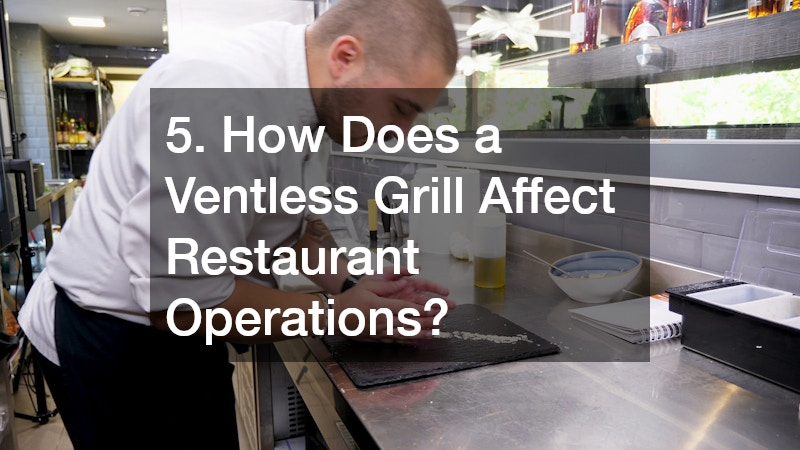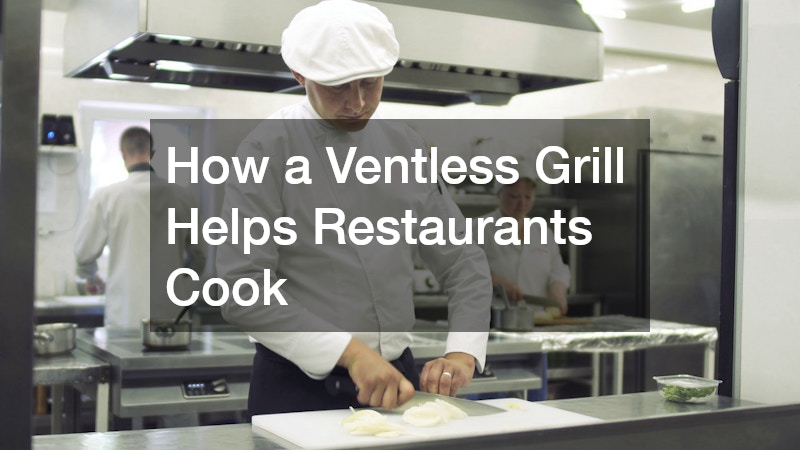How a Ventless Grill Helps Restaurants Cook

This article explores the advantages of utilizing a ventless grill in restaurant kitchens. With the ever-evolving food industry, efficiency and adaptability are crucial for success. A ventless grill provides a unique solution to common challenges faced by restaurateurs.
1. What is a Ventless Grill and How Does it Work?
Definition and Components
A ventless grill is a revolutionary cooking appliance engineered with advanced filtration systems. These grills enable restaurants to operate without traditional exhaust systems, making them adaptable to more varied environments.
The main components include a smoke capture hood and multiple filters, crucial for its operation. Unlike traditional grills, ventless models filter and recirculate air efficiently.
This advanced technology allows restaurants to adhere to health and safety standards without structural modifications. Ventless grills are becoming increasingly popular in urban areas where space and compliance are challenging.
Mechanism of Operation
The working mechanism of a ventless grill is based on a sophisticated combination of recirculating air systems and high-efficiency filters. These filters are designed to trap grease particles and remove smoke.
An internal filtration system captures and processes the airborne particles, releasing clean air back into the kitchen. This technology also helps in maintaining a better indoor environment.
Efficient odor management ensures that these grills are suitable for a variety of settings, including spaces that cannot accommodate traditional hoods. This adaptability makes ventless grills an appealing option for restaurateurs.
2. What are the Benefits of Using a Ventless Grill in Restaurants?
Space Efficiency
Ventless grills offer remarkable space efficiency, a valuable asset for small or densely-packed kitchen environments. They eliminate the need for large ductwork, making kitchen layouts more flexible.
Without needing external ventilation systems, these grills function optimally in limited spaces. This allows chefs to maximize kitchen designs without the constraint of traditional exhaust hoods.
In urban centers, where real estate is costly, the compact design of ventless grills can make a significant impact. Restaurants can utilize every inch of their kitchen space more effectively.
Cost Savings
A notable benefit of ventless grills lies in their potential for cost savings. By obviating the need for traditional ventilation, restaurants can avoid significant upfront installation costs.
Additionally, the reduction in maintenance and energy expenses over time contributes to long-term savings. While initial purchase prices may be high, the investment pays off through decreased overhead.
Ventless grills also reduce the costs associated with compliance and inspection, freeing up financial resources for other business improvements. For budget-conscious establishments, these grills represent a financially prudent option.
3. Are There Limitations to a Ventless Grill?
Capacity Constraints
Despite their many benefits, ventless grills do come with certain limitations, one of which is capacity. Some models may not handle the volume needed in high-demand restaurant environments.
Capacity issues arise depending on the model and the type of food being prepared. Restaurant operators need to match grill capabilities to their specific menu requirements.
Overloading a ventless grill can impact its efficiency and the quality of the food produced. Proper planning and model selection are vital to overcoming these constraints.
Filtration Maintenance
Another consideration with ventless grills is the need for regular filtration maintenance. Efficient operation relies on clean and functional filters.
Operators must adhere to a consistent maintenance schedule to ensure that the filtration systems remain effective. Neglecting this can lead to reduced performance and possible violations of safety standards.
Despite the maintenance required, the technology is designed to provide longevity with proper care. Regular cleaning and occasional parts replacement help maintain the grill’s efficiency.
4. How Does a Ventless Grill Impact Food Quality?
Flavor Retention
Ventless grills have a positive impact on food quality, particularly in terms of flavor retention. The efficient capture of grease and smoke ensures that natural flavors are preserved.
This technology enhances the dining experience by providing foods that taste fresh and flavorful. It gives chefs more confidence in the consistency of their culinary offerings.
The prevention of smoke re-circulation means flavors do not become muddled. Restaurant-goers enjoy meals that maintain both high quality and culinary integrity.
Consistent Cooking Results
The design of ventless grills promotes consistent cooking results, a crucial aspect for any dining establishment. Their advanced systems ensure even heat distribution across cooking surfaces.
This capability minimizes the chances of uneven cooking or raw centers in dishes. Consistency builds customer trust and encourages repeat business.
The technological precision of these grills supports high standards of food preparation. This results in culinary outcomes that align with a restaurant’s reputation and customer expectations.
5. How Does a Ventless Grill Affect Restaurant Operations?
Improved Flexibility
The installation of a ventless grill offers significant flexibility for restaurant operations. Without the constraints imposed by external ventilation, operators can reimagine kitchen layouts.
This adaptability allows for innovative restaurant designs and improved workflows. Kitchens can be organized for optimal efficiency to enhance overall productivity.
Restaurateurs benefit from the ability to place these grills in unconventional spaces. This flexibility supports expanding operations in existing spaces without costly renovations.
Enhanced Safety
Safety is a critical concern in foodservice, and ventless grills deliver enhanced safety features. Many models include built-in fire suppression systems, reducing the risk of fires.
These grills are engineered to minimize common hazards associated with traditional appliances. The reduction in ambient grease and smoke creates safer working conditions for kitchen staff.
By prioritizing safety, ventless grills contribute to a secure work environment that protects both employees and patrons. They allow restaurants to focus on service quality and innovation without compromising safety.







